Understanding ABA Therapy's Role in Social Flexibility
Applied Behavior Analysis (ABA) therapy is a scientifically supported approach widely used in autism treatment to help individuals develop essential social and adaptive skills. This article explores how ABA therapy specifically supports flexibility when individuals with autism enter new social groups, emphasizing practical strategies, individualized interventions, and the importance of generalizing skills across different settings.
Foundations of ABA Therapy in Autism Treatment
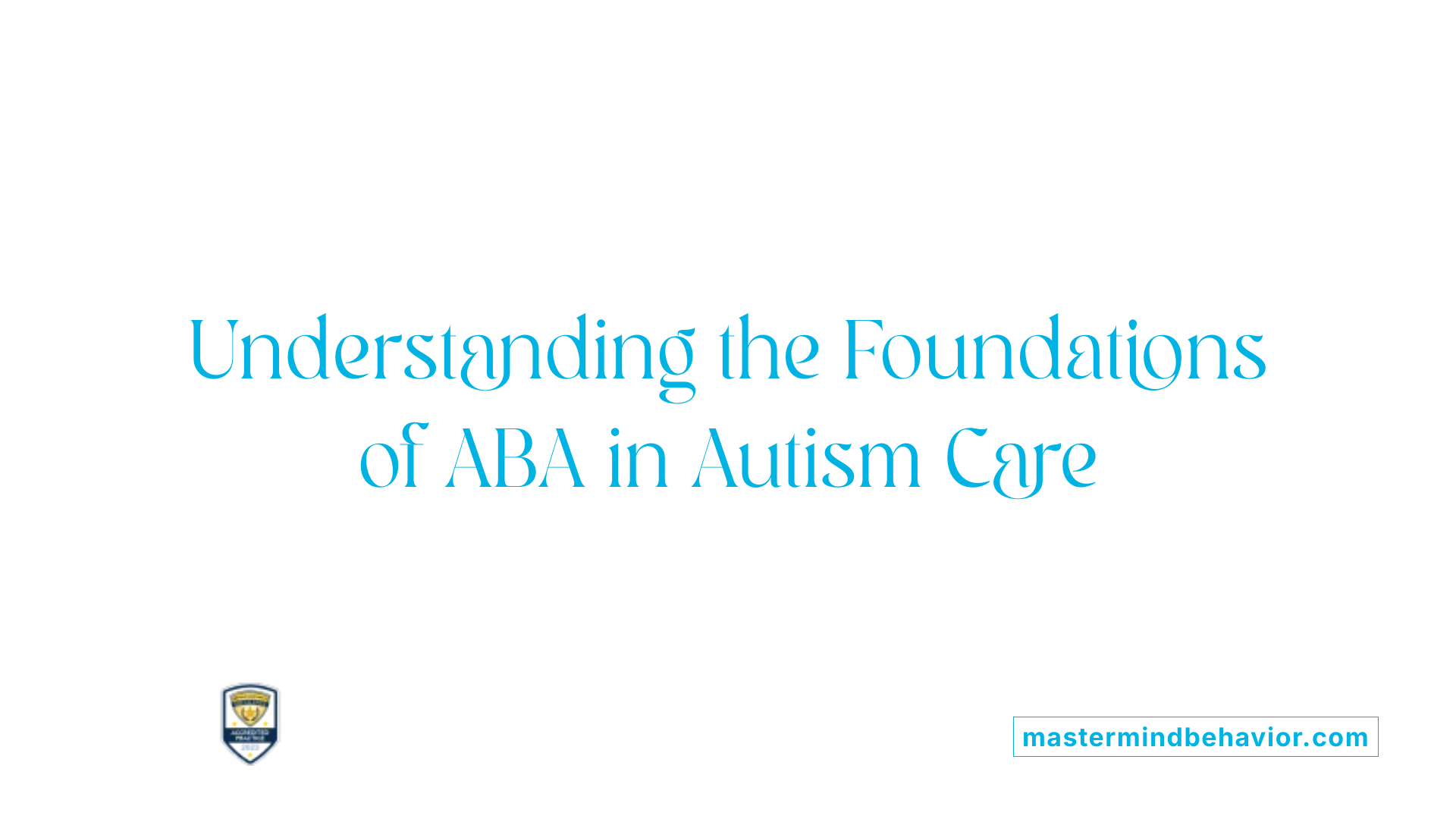
What is applied behavior analysis (ABA) therapy and how is it used in autism treatment?
Applied Behavior Analysis (ABA) therapy is a treatment approach rooted in the science of learning and behavior. It aims to improve a wide range of skills including social, communication, academic, and adaptive behaviors such as hygiene and self-care. ABA is particularly effective for individuals with autism spectrum disorder (ASD), helping them develop vital social and daily living skills.
Core behavioral principles used in ABA
ABA therapy operates on systematic observation of behavior and applies principles like positive reinforcement, where desired behaviors are rewarded to increase their frequency, and negative reinforcement. Techniques such as prompting, modeling, and systematic teaching are utilized. ABA also employs methods such as task analysis, which breaks complex tasks into manageable steps to foster independence, and generalization strategies to ensure learned skills transfer across environments.
How ABA applies to autism spectrum disorder treatment
In autism treatment, ABA is tailored based on comprehensive assessments of individual needs. It includes structured programs such as Discrete Trial Training (DTT) to teach language, social, and self-help skills, natural environment training to apply skills in real-world contexts, and parent-implemented interventions to integrate therapy into daily routines. Advanced strategies like video modeling and peer-mediated interventions further support social growth and self-regulation.
Ultimately, ABA therapy enhances cognitive abilities, social competence, emotional regulation, and reduces core autism symptoms, promoting improved quality of life for those with ASD through personalized, evidence-based care.
Encouraging Social Flexibility Through Positive Reinforcement
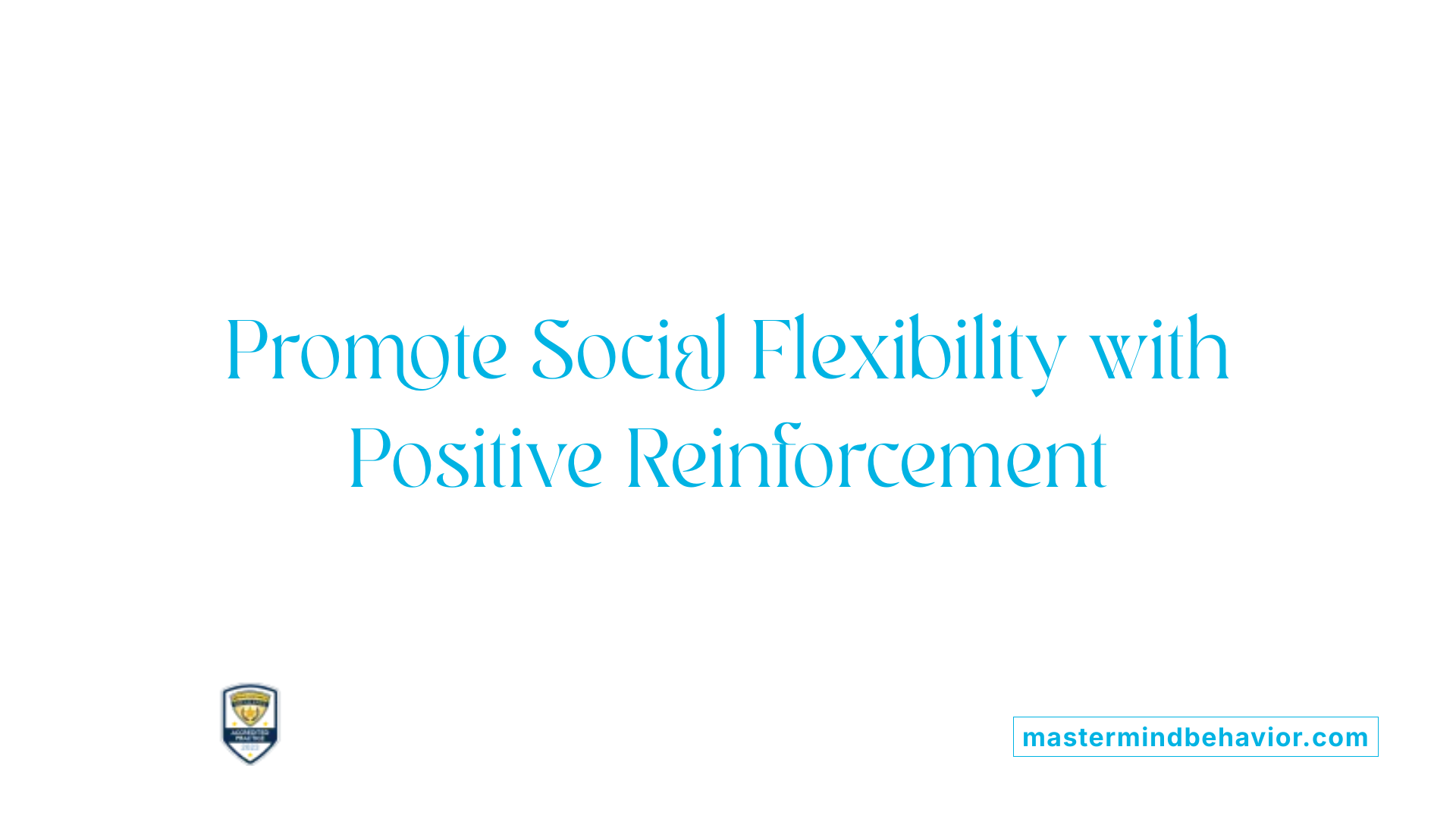
Role of positive reinforcement in shaping behavior
Positive reinforcement is a foundational technique in ABA therapy that strengthens desired behaviors by providing rewarding consequences. When individuals with autism exhibit targeted social behaviors, positive reinforcement encourages these actions to occur more frequently. For example, a child might receive praise, a preferred toy, or access to a favorite activity immediately after making eye contact or sharing a toy, which increases the likelihood they will repeat these social interactions.
Increasing occurrence of desired social behaviors
By consistently applying positive reinforcement, ABA practitioners and caregivers help individuals learn and maintain important social skills. Reinforcement is carefully timed and matched to the individual's interests and motivational triggers. This strategy not only promotes skills such as turn-taking, responding to social cues, and conversational reciprocity but also reduces problem behaviors by redirecting attention towards positive social engagement.
Using reinforcement in new social group settings
Applying positive reinforcement in novel social environments supports the generalization of learned behaviors beyond familiar contexts. When individuals with autism encounter new social groups, reinforcement helps them adapt by rewarding appropriate social flexibility, such as initiating interactions or joining group activities. This approach fosters confidence and increases the comfort level in diverse social situations, making social experiences more enjoyable and meaningful. Encouraging social flexibility through reinforcement techniques ultimately contributes to improved social competence and a better quality of life.
Structured Skill Building: Discrete Trial Training and Task Analysis
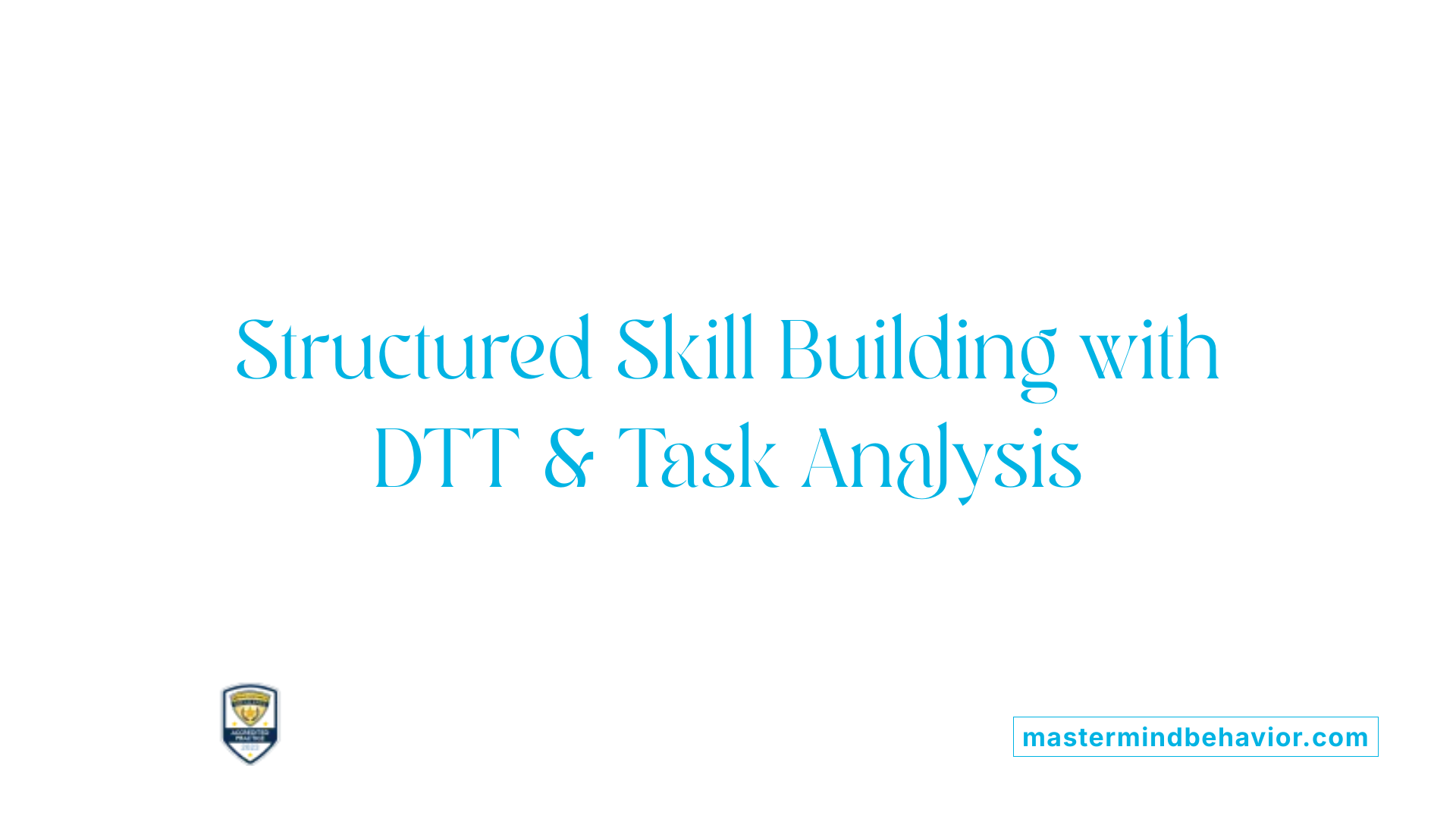
What is Discrete Trial Training (DTT)?
Discrete Trial Training is a highly structured teaching method used in Applied Behavior Analysis (ABA) therapy. It breaks down skills into small, manageable parts called trials, each consisting of a clear instruction, a response from the individual, and a consequence such as positive reinforcement. This method is effective for teaching language, social, and self-help skills by providing consistent practice and immediate feedback.
How does Task Analysis support learning?
Task analysis helps individuals with autism learn complex tasks by dividing them into smaller, sequential steps. This breakdown allows learners to master each step before moving on to the next, promoting gradual independence. For example, brushing teeth can be taught as a series of actions such as picking up the toothbrush, applying toothpaste, and rinsing the mouth.
Teaching Social and Communication Skills Step-by-Step
Both DTT and task analysis are instrumental in teaching social and communication skills. Through DTT, specific behaviors like making eye contact, initiating greetings, or taking turns are taught in discrete lessons. Task analysis complements this by helping learners understand multi-step social interactions, such as participating in a conversation or playing a group game. Practicing these skills within structured trials and broken-down steps enhances mastery and confidence.
Together, Discrete Trial Training and task analysis provide a clear, stepwise framework that supports systematic learning and skill acquisition in individuals with autism.
Natural Environment Training (NET): Applying Skills in Real-World Social Settings

Teaching social skills in natural settings
Natural Environment Training (NET) is an approach within ABA therapy that emphasizes teaching social skills in genuine, everyday settings rather than in highly structured or clinical environments. This method helps individuals with autism learn how to interact naturally by embedding skill development within real-life interactions—whether at home, school, or community venues. NET encourages learners to practice communication, turn-taking, eye contact, and social cues amidst their typical daily activities, making social learning more intuitive and relevant.
Promoting generalization and functional use of skills
One of NET’s major strengths lies in promoting the generalization of social skills. Unlike traditional discrete teaching techniques, NET supports the flexibility of these skills across different people, contexts, and situations. By training in the environments where social exchanges naturally occur, NET helps individuals not only learn new behaviors but also apply them functionally. This leads to better retention and spontaneous use of social abilities, which is essential for meaningful social integration and independence.
Examples of NET in social group adaptation
NET can take many forms tailored to a learner’s needs. For instance, during a playdate, a therapist or caregiver might prompt a child to initiate sharing or ask questions, reinforcing these behaviors in real time. In classroom or community group settings, NET strategies include guiding individuals to participate in group discussions or cooperative tasks while rewarding successful social exchanges. These naturalistic interventions help children adapt to the dynamic nature of social groups, building confidence and enhancing peer relationships.
By rooting social skill training firmly within everyday interactions, Natural Environment Training supports holistic development and empowers individuals with autism to navigate their social worlds more successfully.
Pivotal Response Training (PRT): Motivation and Engagement in Social Learning
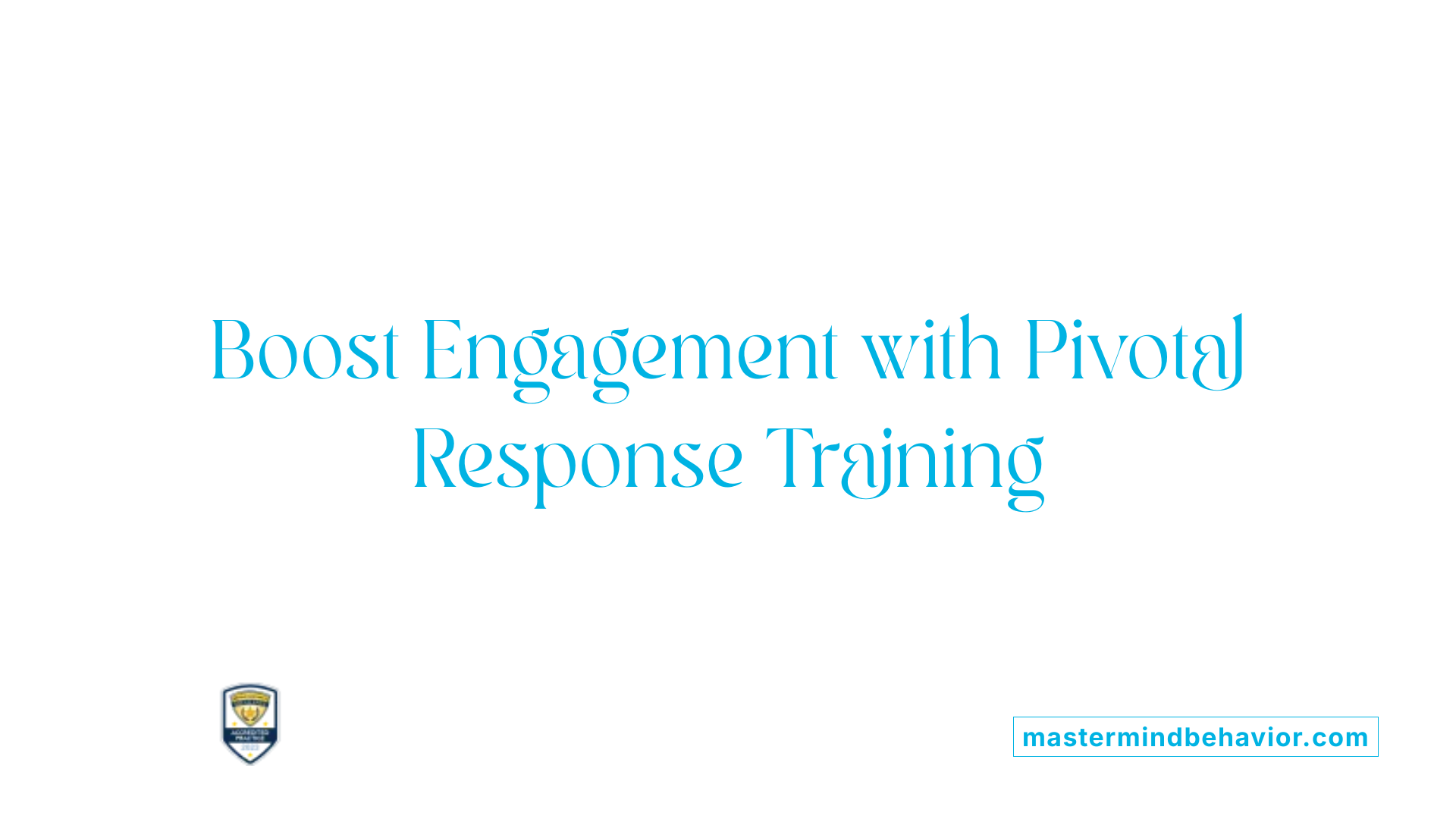
What is the focus of Pivotal Response Training in social skills development?
Pivotal Response Training (PRT) zeroes in on crucial areas pivotal to broader learning, such as communication and social interactions. By targeting these central skills, PRT aims to create ripple effects that enhance multiple aspects of a child's development, promoting improvements not just in isolated behaviors but across various social and communicative functions.
How does PRT use child interests to enhance engagement?
A standout feature of PRT is its use of a child's individual interests and choices to drive the learning process. By incorporating topics and activities the child enjoys, PRT naturally increases their motivation to participate. This personalization cultivates a more engaging and dynamic learning environment, where the child feels empowered and excited to interact and learn new skills.
In what ways does PRT increase motivation to participate in new social situations?
PRT builds motivation by emphasizing natural reinforcement and allowing the child to have control over their learning experiences. Positive reinforcement is delivered immediately after targeted behaviors, encouraging repeated engagement. This approach also facilitates smoother transitions into new social settings by teaching children to respond to cues and expand their social repertoire in a supportive, interest-driven context.
Together, these elements make PRT a powerful ABA strategy that fosters increasing independence, social competence, and willingness to explore social environments.
Parent-Implemented ABA Interventions: Extending Flexibility into Daily Life
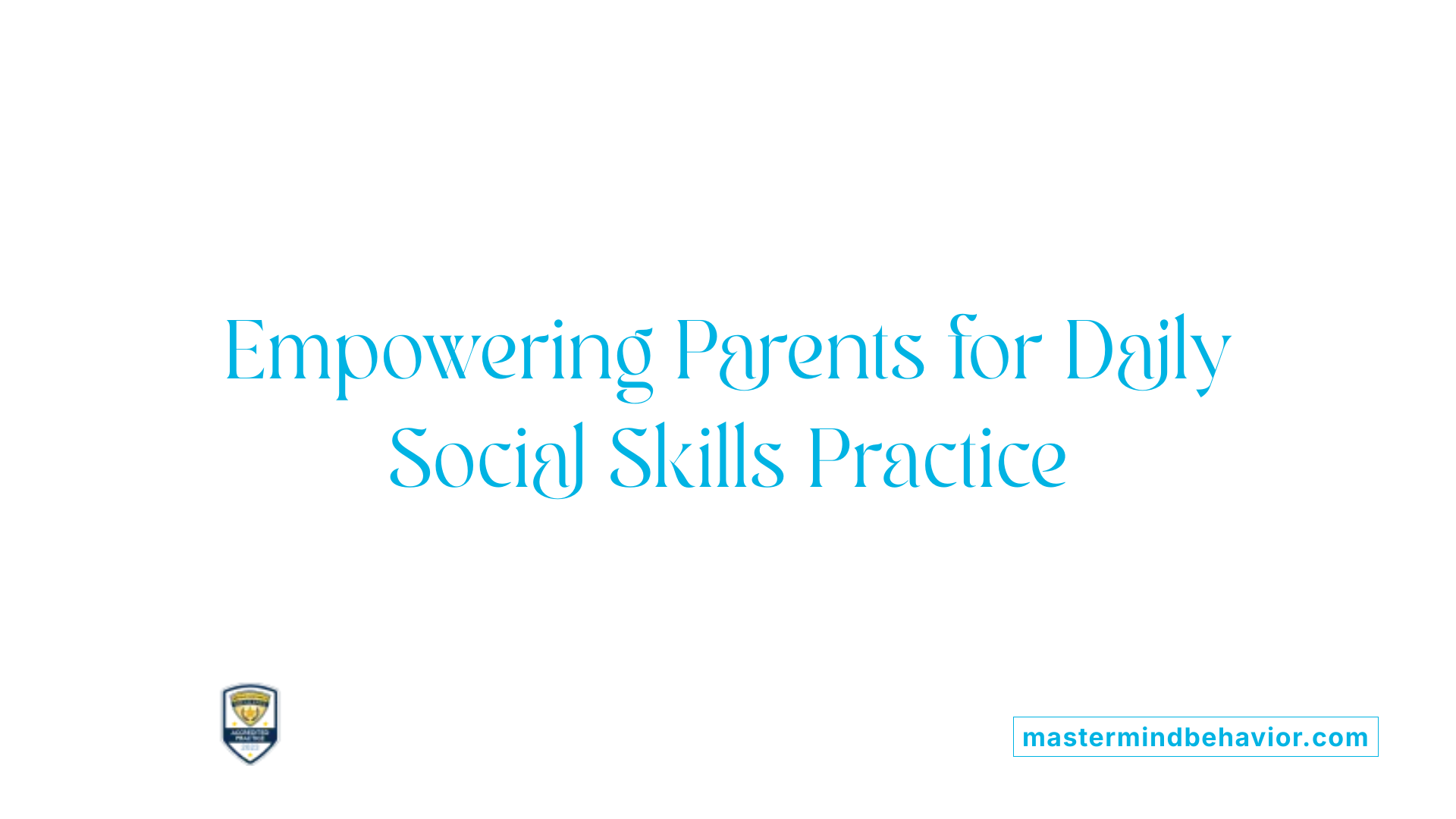
How Are Caregivers Trained to Use ABA Techniques?
Parent-implemented intervention trains caregivers to apply ABA methods effectively. This approach empowers families by equipping them with skills to reinforce desired behaviors in natural settings, beyond formal therapy sessions. Training includes teaching how to apply positive reinforcement, use prompting strategies, and implement task analysis during everyday activities.
How Is ABA Therapy Integrated into Everyday Interactions?
By involving caregivers in therapy delivery, ABA extends naturally into daily life contexts like home routines, mealtime, play, and social outings. Caregivers learn to identify opportunities for teaching social skills during typical interactions, promoting consistent learning. This real-world practice helps individuals with autism make meaningful progress in environments they experience most.
How Does Parent-Implemented ABA Support Social Skill Generalization?
The natural environments where caregivers apply techniques encourage generalization of social skills across settings such as family, school, and community. Involving caregivers ensures social cues, eye contact, turn-taking, and communication skills are practiced repeatedly. This ongoing support fosters confidence and helps children adapt social skills flexibly to different people and situations.
Parent-implemented ABA enhances engagement and continuity, making social development a daily, integrated process rather than confined to clinical settings. It strengthens the connection between therapy goals and real-life functioning, offering individualized, adaptable strategies tailored to the child’s evolving needs.
Customized Social Skills Development Through Individualized Assessment

Comprehensive Assessment of Social Needs
Individualized social skills development in ABA therapy begins with thorough assessments to identify the specific social challenges and strengths of each individual with autism. These assessments guide the understanding of areas such as eye contact, turn-taking, communication, and social cues, forming the foundation for targeted interventions.
Tailored Interventions to Adapt to Individual Differences
Based on assessment results, ABA therapy employs customized strategies that reflect the unique social needs of each person. Techniques like prompting, modeling, and reinforcement are adapted to fit individual preferences and learning styles. This flexibility ensures that interventions remain relevant and effective as the individual grows and their social environment evolves.
Building Social Confidence and Competence
Through personalized ABA programs, individuals build social skills in natural settings such as home, school, and community. The use of positive reinforcement encourages engagement and fosters progression in social behaviors. Advanced practices such as video modeling and peer-mediated interventions promote self-awareness, self-regulation, and perspective-taking, ultimately enhancing social confidence and competence over time.
Advanced ABA Techniques for Promoting Social Awareness and Self-Regulation

What are video modeling, social stories, and role-playing?
Video modeling involves using recorded demonstrations to teach social skills and appropriate behaviors. It allows individuals to observe and imitate positive interactions in a clear, visual format. Social stories are customized narratives that describe social situations and expected behaviors, helping learners understand and navigate complex social events. Role-playing engages individuals in practicing social exchanges or problem-solving scenarios, enabling them to rehearse responses and gain confidence before real-world social interactions.
How do peer-mediated interventions support social integration?
Peer-mediated interventions enlist typically developing peers to facilitate social inclusion and encourage interaction with individuals with autism. These strategies promote natural social experiences by leveraging peers as social models, playmates, and conversation partners. This approach can enhance communication, turn-taking, and friendship-building, contributing to a more inclusive social environment.
In what ways do ABA techniques enhance self-awareness, self-regulation, and perspective-taking?
Advanced ABA methods focus on fostering self-awareness and self-regulation by teaching individuals to recognize their emotions and control their responses. Techniques like role-playing and social stories support perspective-taking by helping learners understand others' feelings and viewpoints. These skills empower individuals to navigate social challenges, reduce problem behaviors, and build empathy, enhancing overall social competence and emotional well-being.
Measuring Effectiveness: Data-Driven Adjustments in ABA Social Strategies
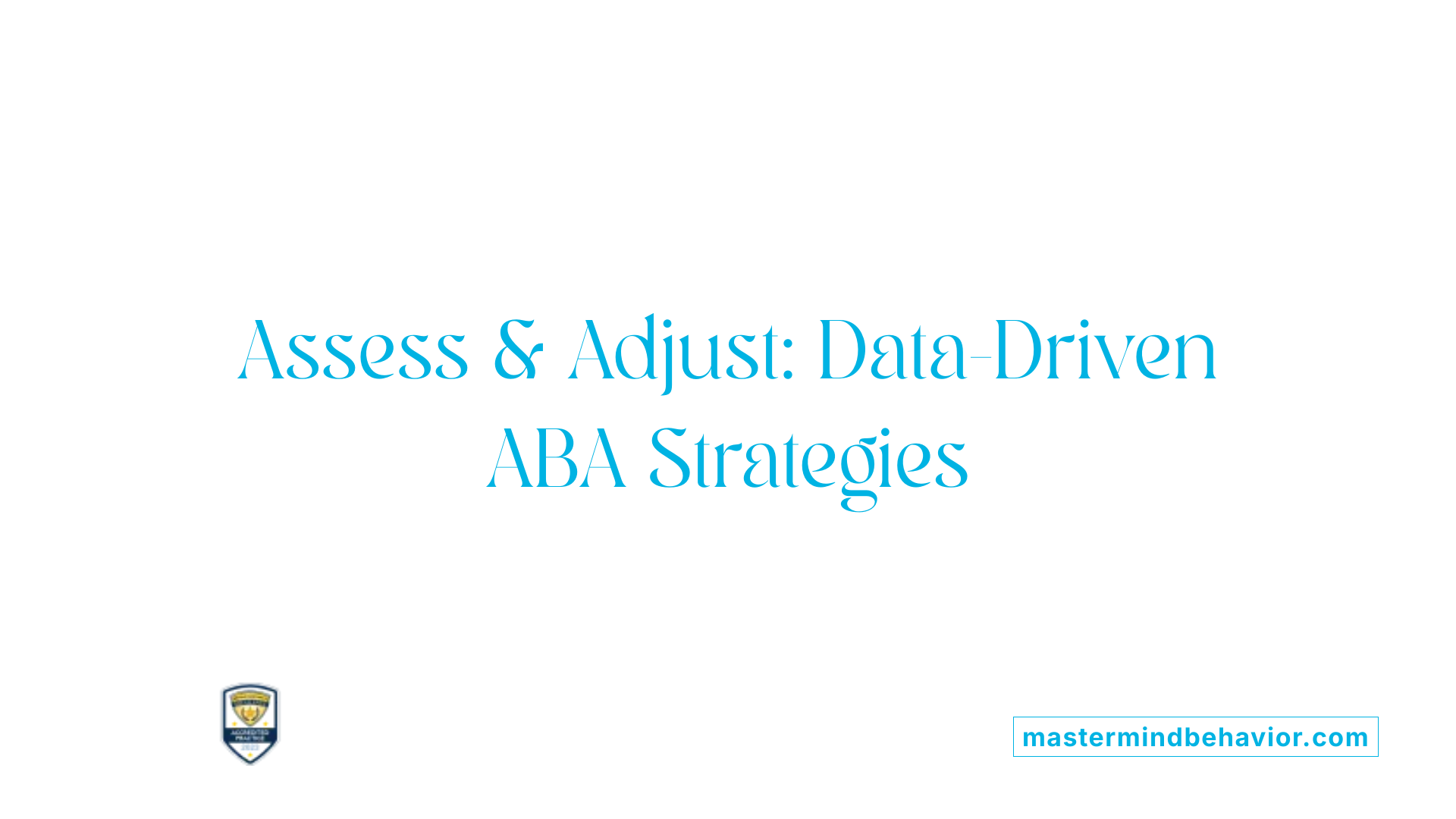
Ongoing data collection and assessment
ABA therapy relies heavily on continual data collection to monitor progress and determine effectiveness. Therapists systematically record behaviors, social interactions, and skill acquisition using standardized metrics. This comprehensive tracking allows for objective assessment of improvements in areas such as communication, social cues, and adaptive behaviors.
Adjusting interventions for optimal social growth
Data-driven insights empower therapists to refine ABA interventions through tailored adjustments. For example, if progress plateaus, techniques like prompting, modeling, or reinforcement schedules may be modified to better suit the individual's learning style. Such flexibility ensures that therapy remains engaging and targets pivotal social skills effectively.
Improving quality of life through continuous monitoring
By continuously evaluating social strategies, ABA practitioners can enhance overall quality of life for individuals with autism. Improvements in social competence, self-regulation, and communication foster greater independence and social integration. This ongoing process ensures that interventions not only target skills but also support meaningful real-world functioning, making therapy outcomes sustainable and impactful.
The Role of Relationship Development Intervention (RDI) in Social and Emotional Skills
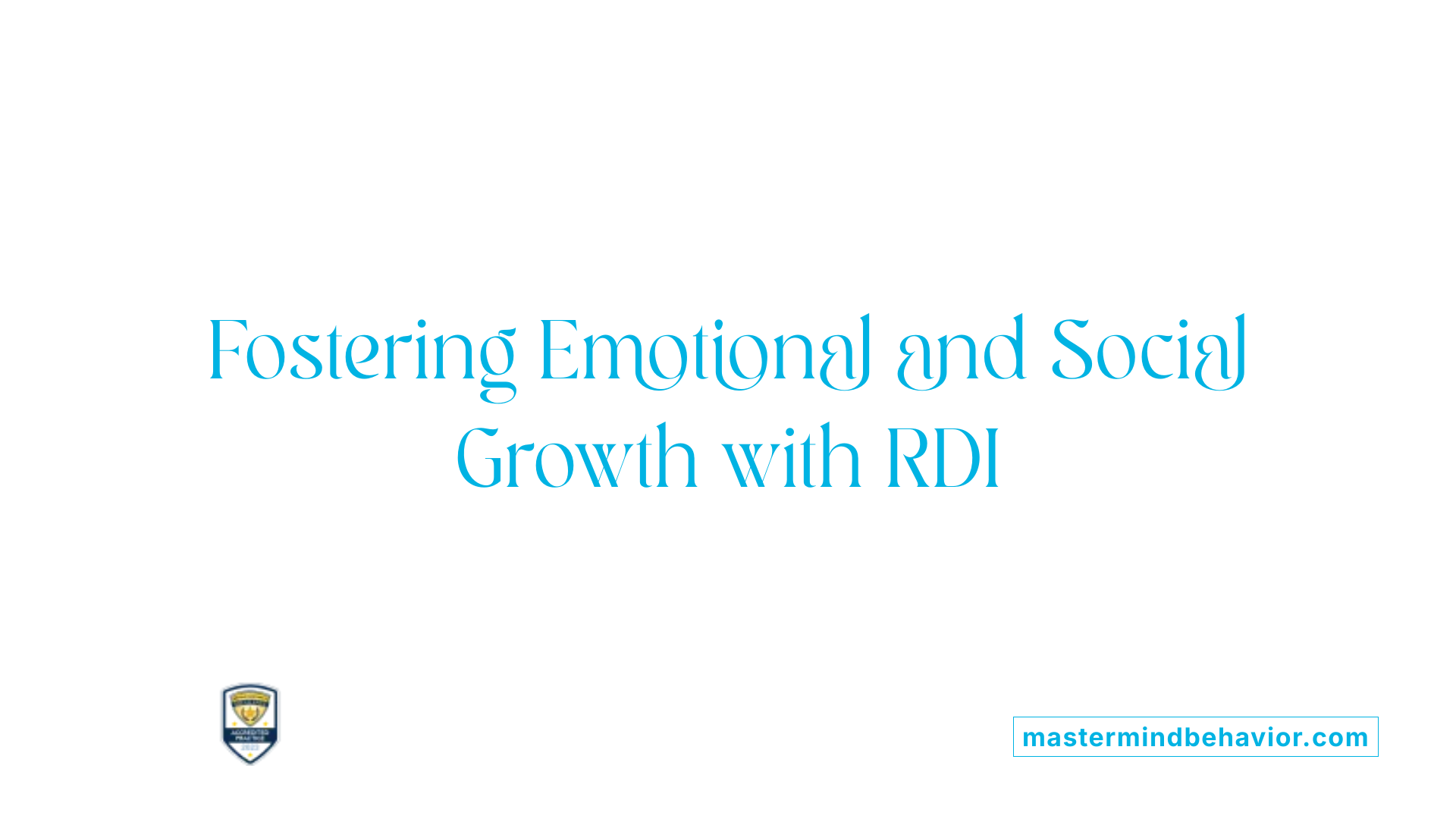
Family-centered approach to social flexibility
Relationship Development Intervention (RDI) is an ABA-based method that emphasizes a family-centered strategy. It actively involves caregivers in the therapeutic process, fostering social flexibility by encouraging responsive and adaptive interactions within the family unit. This foundation helps individuals with autism navigate social situations more fluidly as they experience real-time support and guidance.
Building emotional skills alongside social ones
RDI goes beyond just social behaviors by promoting the development of emotional skills. It targets pivotal areas critical for meaningful social engagement, such as emotional regulation and understanding others’ perspectives. This dual focus enhances the individual's ability to connect emotionally, strengthening empathy and relationship building.
Supporting long-term social adaptability
By integrating these core social and emotional competencies within daily family interactions, RDI supports sustained social growth. Its ongoing, adaptable approach prepares individuals for broader social settings, enhancing social competence and resilience over time. This long-term adaptability is crucial in enabling meaningful participation across various environments and life stages.
Long-Term Impact of ABA Therapy on Social Functioning and Adaptability

How Does ABA Therapy Promote Sustained Improvements in Social Skills and Intellectual Functioning?
ABA therapy, through consistent application of techniques like positive reinforcement, discrete trial training, and pivotal response training, supports sustained enhancements in social interactions and intellectual abilities. Over extended therapy periods, individuals often show increased eye contact, improved turn-taking, and better recognition of social cues. These changes are promoted by individualized goals tailored to each person’s evolving needs, fostering meaningful social competence.
In What Ways Does ABA Foster Development of Daily Living and Adaptive Behaviors?
Beyond social skills, long-term ABA focuses on expanding daily living skills through task analysis and natural environment training. Breaking complex tasks into smaller steps enables individuals to become more independent in self-help activities such as dressing or feeding. Embedding learning in real-world settings ensures these abilities generalize across environments like home and school, improving adaptability and functioning in routine life.
How Does ABA Support Lifelong Social Competence and Flexibility?
ABA interventions prioritize ongoing assessments and adjustments, ensuring strategies remain relevant as individuals mature. Advanced methods such as video modeling and peer-mediated interventions enhance self-awareness and perspective-taking. This dynamic and personalized approach cultivates the flexibility needed for navigating diverse social situations throughout life, ultimately promoting greater emotional regulation and quality of life for individuals with autism.
Building Social Flexibility Through ABA: A Pathway to Inclusion
ABA therapy offers a comprehensive and scientifically validated framework to support individuals with autism as they navigate new and evolving social groups. Through structured, individualized, and naturally integrated techniques, ABA fosters adaptability, social competence, and confidence. The ongoing assessment and customization of strategies ensure that therapy evolves alongside the individual's needs, promoting lifelong social flexibility and inclusion in diverse communities.








